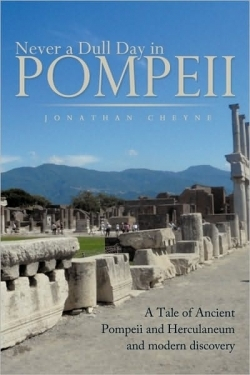Never a Dull Day in Pompeii
A Tale of Ancient Pompeii and Herculaneum and Modern Discovery
Archeologists continue to study the remains of villas built during the Roman Empire to learn more about how the emperors and other people who inhabited them lived. In the past, far too many objects disappeared from these sites, taken mindlessly by tourists or spirited away by unscrupulous antiquities dealers. The present-day Italian government keeps closer watch over its valuable heritage, but the lure of priceless artifacts still motivates dishonest types to attempt stealing them.
Jonathan Cheyne’s Never a Dull Day in Pompeii concerns the search for a villa on the slopes of Mt. Vesuvius that may reveal gold coins coveted by a surreptitious dealer of rare antiques. Englishman Malcolm Manston had previously initiated an unsuccessful dig for the hidden coins. Since then, Malcolm’s talent for psychometry, the ability to envision past events by holding the personal object of someone of that era, has revealed another villa where he’s convinced the treasure lies buried. Malcolm and his young friends, James and Sandra Carrold, use a swinging pendulum and Google Earth maps to determine this villa’s precise location. After successfully raising money to finance the dig, the three travel to Naples and receive permission from local authorities to begin the exploration.
Malcolm explains to James and Sandra the archeological interest in the area around Mt. Vesuvius that was decimated by the AD 79 eruption. “The wealth of information of how the citizens of Pompeii and Herculaneum lived in their day to day lives up to that one fateful day is unique and indescribably valuable,” he says.
While lunching at a pub, Malcolm, James, and Sandra discuss their ideas about raising money for the dig. A man at the next table, Miles Romberg, overhears them and offers to contribute half of the necessary funds. “I am really a very wealthy man,” he explains. “I have enjoyed making money, but I enjoy using it as well.”
The author’s admiration for tales of adventure and intrigue set in foreign countries comes from the writings of his great grandfather, Sir Henry Rider Haggard. Born in Malta, Cheyne has traveled extensively and now lives in England. Besides this novel, he has written several short stories. Cheyne tells a good story populated with well-defined and diverse characters. He introduces interesting subplots and additional minor characters throughout the book. However, the text contains frequent misspelled or misused words, punctuation omissions, run-on sentences, repetitions, and clichés that may tax the patience of some readers.
Fans of adventure with a paranormal twist based on archeological history may overlook these errors and persevere to the book’s conclusion. The epilogue sets the scene for the author’s next novel about a Roman dig site in Ephesus.
Reviewed by
Margaret Cullison
Disclosure: This article is not an endorsement, but a review. The publisher of this book provided free copies of the book and paid a small fee to have their book reviewed by a professional reviewer. Foreword Reviews and Clarion Reviews make no guarantee that the publisher will receive a positive review. Foreword Magazine, Inc. is disclosing this in accordance with the Federal Trade Commission’s 16 CFR, Part 255.

